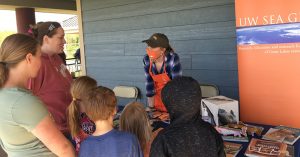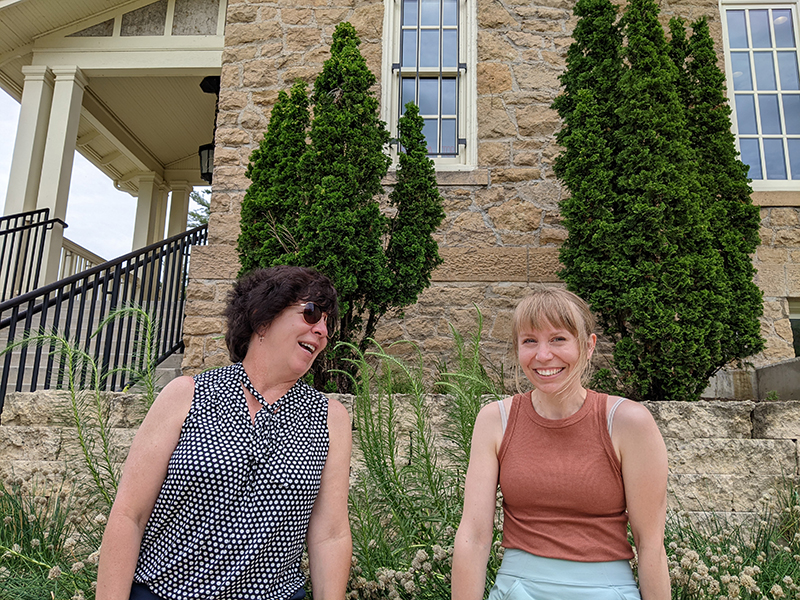Fish are a big part of Emma Kraco’s life. While pursuing her biology degree at the University of Wisconsin-Milwaukee, the recent graduate worked in fish labs in the university’s School of Freshwater Sciences. Those included both a U.S. Department of Agriculture laboratory and one run by Professor Dong Fang Deng. Kraco assisted Deng with a study and subsequent publication on the effects of ingested microplastics on yellow perch fingerlings.
This summer, however, finds Kraco out of the lab and on the road as a Wisconsin Sea Grant intern in the Community Engaged Internship program. She’s part of a cohort of 10 interns working on a range of projects, each with a different mentor.

Emma Kraco talks about Wisconsin fish with attendees at Kids’ Fishing Day at the Northern Great Lakes Visitors Center in Ashland, Wisconsin. (Photo: Sharon Moen)
Kraco works alongside Eat Wisconsin Fish Outreach Specialist Sharon Moen, who looks for ways to support and enhance Wisconsin’s commercial fishing and fish farming industries, as well as engage with consumers to spark their interest in local fish. So far this summer, the two have traveled to Bayfield, Ashland, Green Bay, Milwaukee and numerous other points.
Kraco’s responsibilities include refining the interactive map on the Eat Wisconsin Fish website, which helps consumers locate local fish producers, markets and more. She’s also working on a project to tell the story of yellow perch with respect to its past, present and future as an iconic Wisconsin fish fry staple.
“Emma’s knowledge base, curiosity and enthusiasm have been such a boost for the Eat Wisconsin Fish initiative,” said Moen. “I have been so impressed with the way she has interacted with the fish producers we have met with this summer. Her questions have been thoughtful, and her follow-up has been remarkable. On top of this, I really appreciate her patience in learning Online ArcGIS skills to overcome the mapping challenges laid out for her. I have no doubt that she’ll be one to watch as Wisconsin’s aquaculture scene matures.”
We recently caught up with Kraco for a brief Q&A. Here’s what she had to say:
What has been most enlightening to you about this internship?
The people are one of the most interesting things about this internship. From the small-town dynamics of the local fisheries, to the trials and successes of the farms, I have loved hearing their stories. Each operation is as unique as the person running it. Meeting with producers and seeing where they work has given me a new appreciation for how diverse their needs are. For me, this project has highlighted the importance of extension and outreach work and the need for better science communication.
What’s it like to work with Sharon Moen, Eat Wisconsin Fish outreach specialist? She’s a force!

Sharon Moen and Emma Kraco during a stop by the UW-Madison campus in June 2022. (Photo: Jennifer Smith)
Working for Sharon has been a blast! One of the things that makes her so great to work for is her energy and passion for this project. We’ve been lucky enough to travel throughout the state meeting people in the food-fish production industry. On each of the trips, our days have been packed from morning to night with meetings with fishers and farmers.
Sharon knows how to make the most of our time on the road, but she also knows how to play as hard as she works. We’ve been able to see state parks and museums, sample local cuisine and meet many fabulous Sea Grant professionals and scientists along the way. This internship has given me a whole new appreciation for the state of Wisconsin.
Do you have a favorite fish, either to study or to eat?
I love to eat yellow perch—they are a Midwest staple, after all—but I would jump at the opportunity to work more closely with lake sturgeon. They are such a beautiful, ancient fish with a fascinating life cycle and cultural significance in the Great Lakes region.
What’s next for you after this internship?
I’ll remain in Milwaukee and work full time for the USDA-ARS (U.S. Department of Agriculture-Agricultural Research Service) cold and coolwater fish lab located in the School of Freshwater Sciences. I’m also beginning an online master’s program in Geographic Information Systems, and I plan to continue honing my skills in outreach and aquaculture education.


